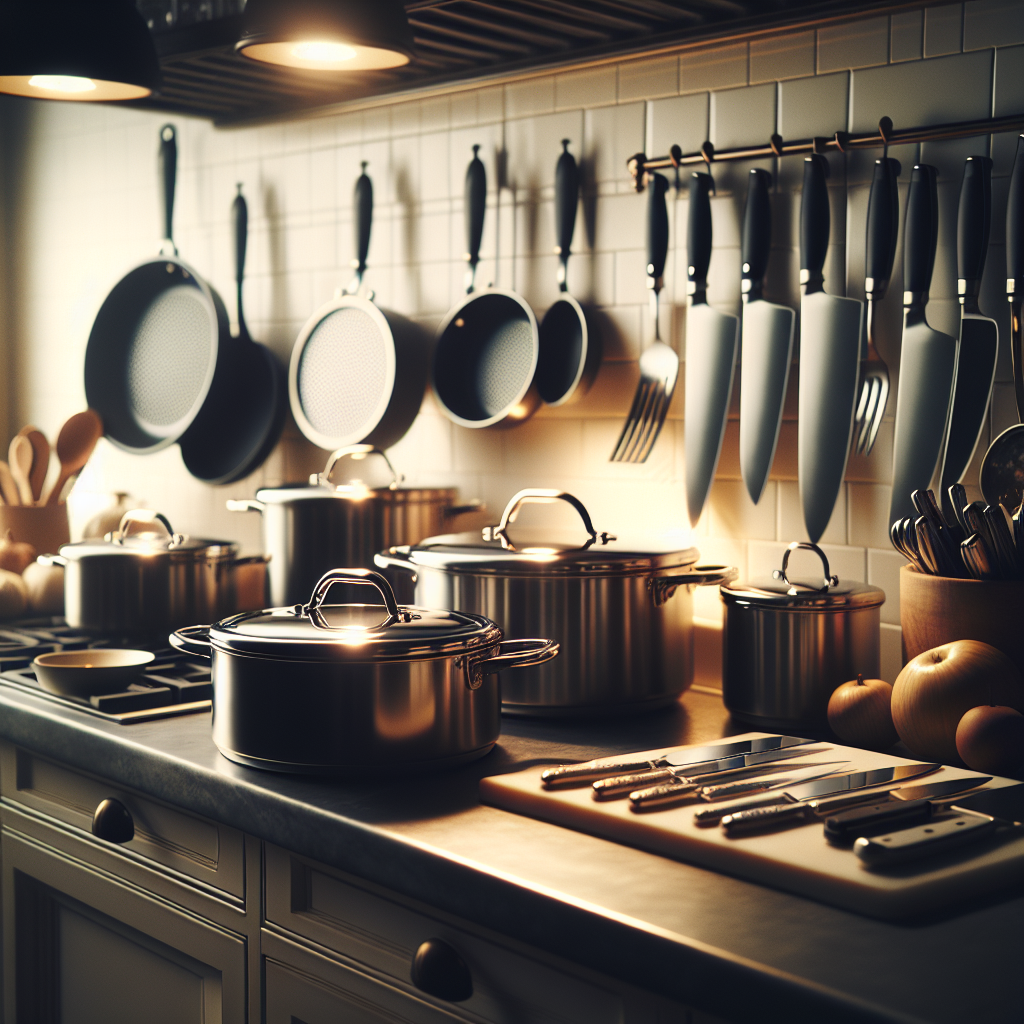Understanding Different Types of Cookware
Material Matters
When it comes to cookware, the material plays a huge role in how your food turns out. From stainless steel to cast iron, each type has unique benefits. For instance, stainless steel is fantastic for browning and braising, while cast iron retains heat impeccably and gives your food that patina of flavor. You’ll want to think about what you cook most often because the right material makes a world of difference.
Some suggestions to consider!
Calphalon Classic Stainless Steel Cookware Set, 10-Piece, Impact-Bonded Aluminum Base, Stay-Cool Handles
34% OffRedchef Ceramic Pots and Pans Set Non Stick, Nonstick Kitchen Cookware Sets, Non Toxic Pots and Pans Set Non Stick, PFAS PFOA & PTFE Free, Detachable Handle Pots and Pans 5 Piece, RV Cookware
33% OffSENSARTE Ceramic Cookware Sets, Pots and Pans Set Non stick, 14-Piece Induction Cookware, Non toxic Healthy Non Stick Kitchen Cooking Set, with Frying Pans Set, PFAS PTFE PFOA PFOS Free
30% Off
Don’t just grab what looks pretty! Familiarize yourself with the pros and cons of various materials. I’ve made the mistake of going for shiny and new without considering functionality, and I learned that lesson the hard way—burnt meals and plenty of frustrating cleanup.
Lastly, don’t shy away from trying out other materials like copper or non-stick. They can be game-changers depending on what you’re whipping up in the kitchen!
Investing in Quality vs. Quantity
Durability Over Price
In my experience, buying quality cookware has always paid off. Sure, the initial price tag might sting, but durable options like high-quality stainless steel or enameled cast iron last for years—sometimes even a lifetime! Rather than jumping at every sale, focus on building a collection of reliable pieces that can withstand daily use.
I’ve gone through my fair share of cheap frying pans that warp, scratch, or become useless after a few months of use. A good quality piece might cost more up front, but it saves me money over time and helps me cook better food.
So, when you’re thinking about purchasing new cookware, keep your eye on durability. It’s about making an investment in your kitchen experience! You’ll be glad you did.
Choosing the Right Cookware for Specific Meals
Consider Your Cooking Style
Your cooking style should guide your cookware choices. Do you love healthy stir-fries? A good non-stick pan is your best buddy. Or maybe you’re into slow-cooked stews; a Dutch oven would be a fantastic fit. Knowing what types of recipes you often whip up allows you to pick the cookware that truly serves you best.
In the early days, I had a hodgepodge kitchen with pots and pans I didn’t use often. After I started curating my cookware based on my favorite meals, it made my cooking process so much more enjoyable. Every piece had a purpose!
Don’t overlook the idea of versatility either. Some cookware can do double duty, like a cast-iron skillet that can go from stovetop to oven. That’s real kitchen magic, making your cooking experience more seamless and fun!
Maintenance and Care for Longevity
Keeping Your Cookware in Top Shape
Caring for your cookware properly isn’t just about keeping things looking nice; it genuinely impacts its performance. Each type of material has its own care guidelines. For example, you shouldn’t put non-stick pans in the dishwasher! I’ve learned that the hard way, and the regret was real.
Regularly seasoning cast iron and properly drying it after washing is crucial too. Neglect that, and you’re inviting rust into your kitchen. Trust me, a little extra effort goes a long way toward preserving your cookware’s life.
Lastly, take those extra moments to read the manufacturer’s care instructions. It’ll save you from a lot of frustration and keep your investment in great shape!
Creating a Balanced Cookware Collection
Essential Pieces for Every Kitchen
Building a balanced cookware collection means blending the practical with the aspirational. Start with the basics like a quality skillet, saucepan, and a large pot. From there, you can explore specialty items that fit your cooking style and interests.
I always recommend having a good non-stick frying pan for eggs and pancakes, along with a heavy-duty pot for soups and stews. And if you dabble in baking, consider picking up a few baking sheets and cake pans. The right tools can truly elevate your cooking game.
As you expand your collection, keep your needs and space in mind. There’s no need to buy every pot and pan out there. Focus on what you use most and in styles that resonate with your culinary adventures.
Frequently Asked Questions
1. What material is best for cookware?
The best material really depends on what you cook most often. Stainless steel is great for browning, while non-stick is perfect for delicate foods like eggs.
2. Is it worth investing in high-quality cookware?
Absolutely! High-quality cookware tends to last longer and performs better, saving you money in the long run.
3. How do I care for cast-iron cookware?
Season it regularly, avoid soap, and always dry it thoroughly. This prevents rust and keeps it in great condition.
4. Do I need non-stick pans?
If you often cook foods that might stick, like eggs or pancakes, having a non-stick pan can make cooking and cleaning much easier.
5. How can I find the right balance in my cookware collection?
Start with the essentials like a skillet and saucepan, then gradually add specialty pieces based on what you enjoy cooking the most.


















